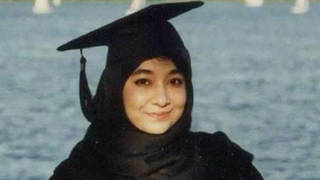
Guests
- Mahmood Mamdaniteaches at Makerere University in Uganda and at Columbia University in New York City. He is the author of several books, including Saviors and Survivors: Darfur, Politics, and the War on Terror and Good Muslim, Bad Muslim: America, the Cold War, and the Roots of Terror.
Near the end of Monday’s Republican presidential debate, Republican Rep. Ron Paul of Texas drew boos from the crowd and a rebuke from other candidates on the podium when he criticized U.S. foreign policy in discussing the roots of the 9/11 attacks. “We’re under great threat because we occupy so many countries,” Paul said. “We have to be honest with ourselves. What would we do if another country, say China, did to us what we do to all those countries over there?” Our guest, Columbia University Professor Mahmood Mamdani, responded to Dr. Paul’s comments by saying, “He sounds like a professor. I mean, he’s trying to educate his audience, and the audience is not ready to be educated. It wants to be rallied to a cause that it doesn’t have to think about.” Mamdani is the author of several books, including “Good Muslim, Bad Muslim: America, the Cold War, and the Roots of Terror.” [includes rush transcript]
Transcript
AMY GOODMAN: You come back from Uganda in the midst of the presidential race for next year, 2012. There was a big Tea Party debate the other night that CNN had. Toward the end of the debate, Ron Paul, one of the Republican candidates, the Congress member from Texas, drew boos from the crowd and a rebuke from other candidates when he criticized U.S. foreign policy, discussing the roots of 9/11. We played this for Noam Chomsky yesterday. We’d also like to get your comment, Professor Mamdani.
REP. RON PAUL: We’re under great threat because we occupy so many countries. We’re in 130 countries. We have 900 bases around the world. We’re going broke. The purpose of al-Qaeda was to attack us, invite us over there, where they can target us. And they have been doing it. They have more attacks against us and the American interests per month than occurred in all the years before 9/11. But we’re there, occupying their land. And if we think that we can do that and not have retaliation, we’re kidding ourselves. We have to be honest with ourselves. What would we do if another country, say China, did to us what we do to all those countries over there?
So, this whole idea that the whole Muslim world is responsible for this and they’re attacking us because we’re free and prosperous, that is just not true. Osama bin Laden and al-Qaeda have been explicit. They have been explicit, and they wrote and said that we attacked—we attacked America because you had bases on our holy land in Saudi Arabia, you do not give Palestinians a fair treatment, and you have been bombing—I didn’t say that, I’m trying to get you to understand what the motive was behind the bombing. At the same time, we had been bombing and killing hundreds of thousands of Iraqis for 10 years. Would you be annoyed? If you’re not annoyed, then there’s some problem.
AMY GOODMAN: Yes, that was Republican presidential candidate Ron Paul, the Republican Congress member from Texas, who is the father of Rand Paul, the Kentucky senator. Mahmood Mamdani?
MAHMOOD MAMDANI: Well, I had missed this completely, you know? And I’m very thankful that you’ve given me an opportunity to listen to this. He sounds like a professor. I mean, he’s trying to educate his audience, and the audience is not ready to be educated. It wants to be rallied to a cause that it doesn’t have to think about. But it’s great that this is part of the public debate in the U.S. today. It’s obviously a fringe voice by, you know, the—
AMY GOODMAN: Do you think President Obama would ever sound like that?
MAHMOOD MAMDANI: No, no, no. I don’t think so. He could have sounded like that in a classroom, but I don’t think he would sound like that on a public platform, not after drones and after, you know, the responses to the whistleblowers and WikiLeaks. And look, you know, during Bush, we used to think that the problem was that the rule of law had been suspended and there were all these prisons all over the place. And now the preferred strategy is assassination. It’s not taking people to prisons. There’s no need for Abu Ghraib or [Guantánamo] or anything. It’s just to unleash a drone. So, it’s—and I’m not saying this—I’m not connecting this directly to Obama or anything, but the point is that that’s where things are moving. Nobody can deny that’s where they’re moving. And we can discuss who was responsible. But that’s the direction in which things are moving. And I think that’s cause for huge concern.
AMY GOODMAN: Well, Professor Mahmood Mamdani, you mentioned one in six Americans are poor, and that’s going to be our next segment. I want to thank you so much for being with us. Professor Mahmood Mamdani is just back from Kampala, Uganda, after several months, written extensively on regional and global implications of NATO’s intervention in Libya. He teaches here in New York at Columbia University, author of a number of books, among the books, Saviors and Survivors, as well as Good Muslim, Bad Muslim: America, the Cold War, and the Roots of Terror. This is Democracy Now! We’ll be back on the issue of poverty in America in a minute.












Media Options